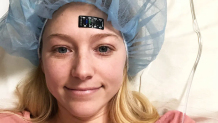When Kelly Spill was 8 months pregnant, she started experiencing new symptoms, including constipation and blood in her stool. Her doctor assured her it was part of pregnancy.

Courtesy Kelly Spill
“She pretty much said, ‘You’re having a baby in about a month, and things are moving around. Things are a little different in your body because you’re about to give birth,’” Spill, 31, of Bradley Beach, New Jersey, tells TODAY.com. “That made sense to me.”
The symptoms continued for about eight months and worsened. Doctors kept telling her that her bowel habits had changed because she recently gave birth. Finally, a doctor ordered a colonoscopy, and she learned what was behind her symptoms. Spill, then 28, had stage 3 colorectal cancer.
Get DFW local news, weather forecasts and entertainment stories to your inbox. Sign up for NBC DFW newsletters.
“I felt very exhausted, and it made me second-guess what I was actually feeling because I was being brushed off,” she says. “When you don’t have someone listening to you, it’s really, really hard to continue to keep going.”
Pregnancy and bowel changes
While Spill’s doctor told her the symptoms were likely due to being pregnant, she became worried when they persisted and progressed, especially after she gave birth.
Health Connection
Get connected to a healthier life.
“I still was majorly constipated. I still had blood in my stool, and it was a dark, sticky type of blood, not bright red,” she says. “I always feel weird saying this, but I know it’s important to say that it had a weird smell to it.”
When she visited her doctor for her postpartum checkup, she detailed her symptoms.
“They pretty much said they’re 99.9% positive its internal hemorrhoids,” she recalls. “That sounded right to me as a new mom.”
Her doctor recommended that Spill visit her primary care physician if the symptoms persisted. Spill and her partner were in the middle of moving from California to New Jersey, but she visited her primary care doctor before leaving. He, too, thought it was internal hemorrhoids and ordered blood work, which came back normal.
“I was very stressed about moving back to the East Coast, and I was like, ‘You know what? It seems like it’s just internal hemorrhoids. I’m just going to put my health aside right now and focus on my child, focus on moving,’” Spill recalls. “That’s exactly what I did.”
When her son was 5 months old, Spill began experiencing new, worrying symptoms.
“I was experiencing loss of appetite. I’d be really, really hungry, and then I would want something, I would take a bite and I wouldn’t be hungry anymore,” she says, adding she lost 7 pounds. “That became alarming.”
Spill struggled to work because she experienced fatigue and just didn’t feel well. One day, when she used the bathroom, she felt stunned by what she saw.
“There was a pool of blood in the toilet,” she says. “That’s when I was like, ‘Something’s not right.’”
Spill and her mom went to the emergency room, where a doctor again told her she had internal hemorrhoids.
“He told me to lay off the spicy foods,” she says. “(I felt) like I was brushed off.”
She got into a new family clinic, and doctors again suspected hemorrhoids. But this time, she met someone who made a huge difference in Spill’s search for a diagnosis.
“(The nurse) said to me, ‘I just want to say one thing: If you don’t find your answer here, keep searching. Keep going. You know your body best,’” Spill says. “That is something that has stuck with me from that day.”

Courtesy Kelly Spill
Spill told friends and family about what she was feeling, and then a friend’s mom suggested another primary care doctor. All this time, Spill had been taking photos of what was in the toilet and showed the new doctor.
“She was like, ‘Oh, you need to get a colonoscopy, don’t you?’ And I said, ‘Yes, 100% I need a colonoscopy,’” Spill says.
Soon she met with a gastrointestinal doctor and received a colonoscopy the next day.
“I found out that I had a tumor,” she says. “It was a very weird feeling because I knew at that point something wasn’t right. I knew it wasn’t going to be good. But I didn’t get upset until I left that room.”
She broke down in the parking lot and cried. Soon, she learned it was stage 3 colorectal cancer. Doctors gave her time to preserve her eggs because she and her partner hoped to have another child, and chemotherapy and radiation would likely impact her fertility. At the time, she and her partner were engaged and planning to get married in Switzerland.
“I remember asking the doctor … ‘Can I at least go to Switzerland this summer and get married?’” she says. “He basically was like, ‘Absolutely not.’”
As she prepared for treatment, a research nurse approached her about a clinical trial. If Spill opted to do it and it shrunk her tumor, she could skip surgery, chemotherapy and radiation. If it didn’t work, Spill would have to go through traditional treatment. She opted for the clinical trial for an immunotherapy drug. With cancer, immunotherapy activates the immune system to fight the cancer.
“I didn’t know that I was only the fourth person in the country on the drug,” she says. “I knew the side effects and knew that it sounded a lot better than chemotherapy, radiation and surgery.”
Immunotherapy for colorectal cancer
In some colorectal cancers, the tumor has a genetic mutation called a mismatch repair deficiency, and immunotherapy works well in treating those cancers, Dr. Andrea Cercek, medical oncologist at Memorial Sloan Kettering Cancer Center, says. Researchers wondered if immunotherapy could replace the traditional standard of care — surgery, radiation and chemotherapy — for these types of colorectal cancers up to stage 3.
“We didn’t take away any treatment (from these patients), but we started with immunotherapy,” Cercek, a Stand Up To Cancer Colorectal Cancer Dream Team investigator, tells TODAY.com.
For the study, which is ongoing, patients receive the medication, called dostarlimab, via infusion every three weeks for six months. Dostarlimab is already used in stage 4 colorectal cancer and other cancers, so the researchers had prior data on safety and dosing. After a patient completes therapy, doctors perform an MRI of the rectum and an endoscope to see if the tumor has shrunk.
“If the tumor was completely gone by the endoscopy, as well as the MRI, then the patients had what we call a clinical complete response, meaning that there’s no sign of the tumor,” Cercek says. “We are able to follow them really closely every four months with some evaluation.”

Courtesy Kelly Spill
The study has enrolled 42 patients. A global study with the same design is also ongoing. If the trials are successful, the treatment could be transformative for colorectal cancer patients with this mutation.
“We can spare patients the toxicity of the radiation and ... surgery, which is a big deal,” Cercek says. “If the patient needs surgery, about a third of them end up needing a permanent colostomy bag, and it can really change people’s quality of life.”
It's not yet clear how often the immunotherapy drug prevents recurrence of cancer and whether it can be effectively taken more than once, according to Cercek. Any patients in the trial whose cancer returns would receive the traditional treatment, she adds.
'Best day of my life'
After Spill’s second infusion, she noticed a difference.
“I felt great,” she says. “I ended up being able to go to the bathroom. So, it seemed like the tumor was shrinking.”
By her fourth treatment, her tumor had shrunk by half.
“By my ninth treatment, the tumor had completely disappeared, which was probably the best day of my life,” she says.
Every six months, Spill undergoes screening, including a PET scan, an MRI and a sigmoidoscopy.
“I’ve been feeling amazing,” she says.
What’s more, she was able to get pregnant, and she gave birth to a daughter, Maya Grace, on July 14. Thinking about having another child kept her motivated as she struggled to be diagnosed and throughout treatment.
“I had a chance to bring another life into the world, and it’s been very humbling,” she says. “I feel so grateful for every opportunity that comes my way.”
Having cancer caused her to reflect on who she is and what she wants.
“I (joined) a leadership program to learn more about myself,” she says. “I’ve been on a big finding-myself journey for a long time now, and cancer has really pushed it along for me.”
She participated in the recent Stand Up To Cancer telecast because she's experienced the power of new cancer research firsthand. Spill hopes her story encourages others to speak up when they don’t feel right.
“Go with your gut when you feel something is up with your body,” she says. “Really advocate for yourself, continue to push.”
This story first appeared on TODAY.com. More from TODAY:




